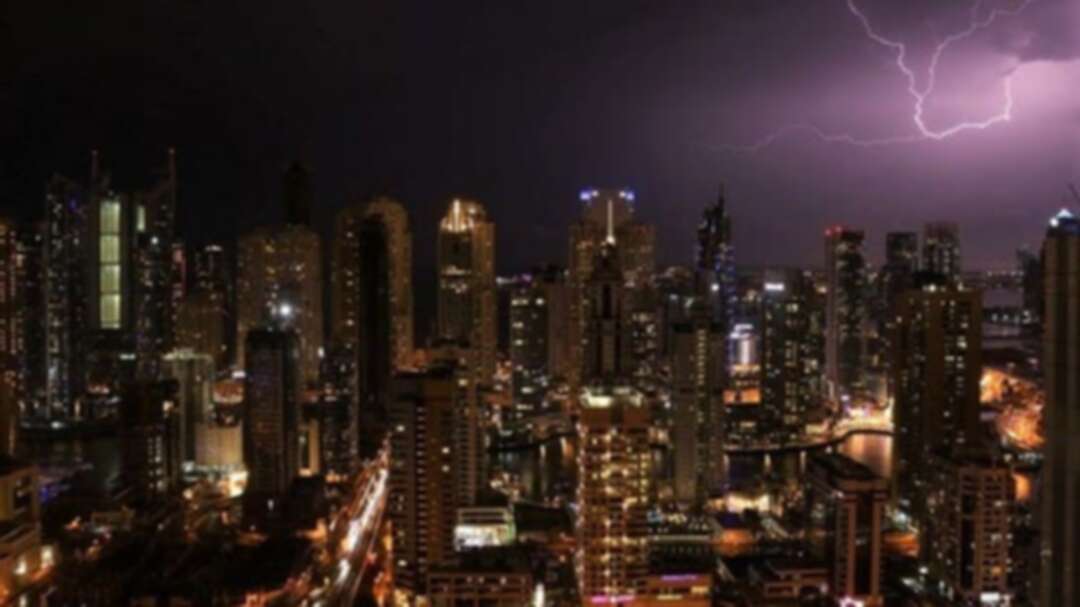-
UAE weather: Lightning, thunder, hail hit Dubai

Dubai was hit by bright lightning and booming thunder Saturday night, and floods occurred across the city. UAE weathe
It had rained on and off during the day Saturday, but Saturday night brought more rain, hail, and the accompanying lightning show that lit up the sky.
https://twitter.com/mkhan185/status/1241399946554859520
The average rainfall for March in Dubai is 13 millimeters, slightly lower than the averages for January and February.
Social media users shared footage saying they had never seen anything like the storm.
https://twitter.com/fazzyfocus/status/1241402588169412608
How is hail created?
Hail seems out of place in the desert, but hail forms when the air is warm, moist, and stormy, and it’s created when the upper atmosphere temperature is cold enough to create ice.
When updrafts carry water droplets up into cold parts of the atmosphere and those raindrops freeze, hail is created. UAE weathe
https://twitter.com/rogerframes/status/1241473891463311365
Hailstones can grow when they collide with other raindrops that freeze onto the original stone.
This process repeats until the hail is too heavy for the storm to hold and gravity pulls it toward the earth or the updraft weakens and can no longer hold the small ball of ice. Hailstones can be as small as a pea or a coin and can be as large as a baseball, and that size is largely dependent on the strength of the storm. Globally hail occurs most frequently in areas that are warm and wet. In the United States, three states dubbed “hail alley” – Nebraska, Colorado, and Wyoming – typically have the most hailstorms in the country. China, Russia, India, and northern Italy also see a lot of hail. levant
source: Lauren Holtmeier levant
You May Also Like
Popular Posts
Caricature
BENEFIT Sponsors BuildHer...
- April 23, 2025
BENEFIT, the Kingdom’s innovator and leading company in Fintech and electronic financial transactions service, has sponsored the BuildHer CityHack 2025 Hackathon, a two-day event spearheaded by the College of Engineering and Technology at the Royal University for Women (RUW).
Aimed at secondary school students, the event brought together a distinguished group of academic professionals and technology experts to mentor and inspire young participants.
More than 100 high school students from across the Kingdom of Bahrain took part in the hackathon, which featured an intensive programme of training workshops and hands-on sessions. These activities were tailored to enhance participants’ critical thinking, collaborative problem-solving, and team-building capabilities, while also encouraging the development of practical and sustainable solutions to contemporary challenges using modern technological tools.
BENEFIT’s Chief Executive Mr. Abdulwahed AlJanahi, commented: “Our support for this educational hackathon reflects our long-term strategic vision to nurture the talents of emerging national youth and empower the next generation of accomplished female leaders in technology. By fostering creativity and innovation, we aim to contribute meaningfully to Bahrain’s comprehensive development goals and align with the aspirations outlined in the Kingdom’s Vision 2030—an ambition in which BENEFIT plays a central role.”
Professor Riyadh Yousif Hamzah, President of the Royal University for Women, commented: “This initiative reflects our commitment to advancing women in STEM fields. We're cultivating a generation of creative, solution-driven female leaders who will drive national development. Our partnership with BENEFIT exemplifies the powerful synergy between academia and private sector in supporting educational innovation.”
Hanan Abdulla Hasan, Senior Manager, PR & Communication at BENEFIT, said: “We are honoured to collaborate with RUW in supporting this remarkable technology-focused event. It highlights our commitment to social responsibility, and our ongoing efforts to enhance the digital and innovation capabilities of young Bahraini women and foster their ability to harness technological tools in the service of a smarter, more sustainable future.”
For his part, Dr. Humam ElAgha, Acting Dean of the College of Engineering and Technology at the University, said: “BuildHer CityHack 2025 embodies our hands-on approach to education. By tackling real-world problems through creative thinking and sustainable solutions, we're preparing women to thrive in the knowledge economy – a cornerstone of the University's vision.”
opinion
Report
ads
Newsletter
Subscribe to our mailing list to get the new updates!






















